- Home
- Robin McKinley
Dragon Haven Page 10
Dragon Haven Read online
Page 10
“Well,” I said uncomfortably, “she seems to have sort of—imprinted on me.”
My father nodded, and I saw his eyes flicker to the short shelf of primary sources on dragon contact.
The dragonlet chose this moment to wake up again. I’d already begun to notice that she was a little more active in the daytime, when I was (comparatively) more active—and I was also wondering if she could pick up anxiety. A dog does, and a dog doesn’t live pressed up to your stomach all the time. On the other hand, dogs have been living with humans for thirty or forty thousand years and dragons have been avoiding humans for a lot longer than thirty or forty thousand years. Maybe it’s just that my stomach gurgles more when I’m nervous and the noise would wake her up.
“I think I’m going to have to feed her,” I said apologetically.
“Go ahead,” said my father. Very drily he added, “I want to meet her.”
I pulled up my two layers of sweatshirts and slid her out behind the sling inside my shirt in what were by now very practiced moves, but having my father watching me made me self-conscious in a way the Rangers hadn’t. My stomach isn’t particularly lovely anyway, but I wanted to be sure my father did not notice any strange red scalded patches (although chances are, with a baby dragon in the room, he wasn’t going to notice anything else short of a pterodactyl divebombing through the ceiling). Also, while to me the dragonlet looked a whole lot better than she had that first afternoon I’d picked her up still covered with birth slime, she still looked…while I balanced her in one hand before smushing her up my (extra-large, extra-stretched) sleeve, and fished for her broth bottle I saw her as my dad must: ugly damn little critter, shapeless pulpy-looking body in that awful bruise color, little spastic legs with half-formed toes (no claws yet, fortunately for me) and a squished-looking head, and glistening all over from the salve.
The diaper made her look like some kind of truly grotesque doll—you know how little kids will diaper their teddy bears or whatever. Eleanor used to put diapers on her purple plush iguana (speaking of tail problems), although the dragonlet’s at least hid some of her unloveliness which had to be a good thing. (It hid quite a lot really due to the logistics of keeping it in place.) But the dragonlet looked like one of those gross things you see supposedly pickled in bottles in movies about mad scientists. Not just hairless—or in the dragonlet’s case scaleless—but somehow skinless, although she wasn’t, and deformed, which I had no idea if she was or not. She was more or less symmetrical, in her squashy, sort of jelly-y way, which was probably good as far as it went. But she looked, well, fetal, which she pretty much was. She wasn’t supposed to be out here in the air, needing salve and sweatshirts. And broth bottles. She was supposed to be in her mom’s pouch, stuck on a nipple for the next however many months. Or something like that.
I decided not to try to tell my dad how much better she looked than she had a few weeks ago. Or why she was still alive on deer and squirrel broth, which I didn’t have a clue about myself.
Or that I dreamed of dragons, big grown-up dragons, almost every night, in those two-hour chunks, and now that I was sleeping for longer the dreams felt like they got bigger, and I used to wake up out of those dreams lately with my headache bigger than my skull for a while. There was usually a moment, before I was fully awake again, where I’d think, that’s it, you stay out there, before it fell in on itself like a tent being taken down and jammed itself and all its sharp edges and too-long pointy tent poles back inside my head again.
She drank half a bottle and collapsed, the way she always did, going from some kind of pathetic baby animal with something terribly wrong with it, to something more like a beanbag or a water balloon in the shape of a you don’t know what, but whatever it is, you hope they don’t make any more. I gathered her up—she was nearly twice as long now as she’d been when I’d found her—shoved her back under my shirt, and wiped my greasy hands on my jeans. I was going to have major trouble if she started jumping around much before she grew thick enough skin not to need to be oiled all the time.
There was silence for a long tense moment.
“And what is it you’re suggesting we do?” said my father to Billy.
“Jake will have come back from his first overnight solo in the park knowing that he wants to apprentice as a Ranger,” said Billy. “You will believe him, and decide that this is a good thing for him to do. He will have to keep up with his schoolwork—”
“Yes he will,” said my father.
“—But so long as he does so I don’t think anyone will ask too many questions.” I loved Billy at that moment for not taking the opportunity to give me an “are you paying attention to this, I am the grown-up and I’m doing you a biiiig favor so you’d better cooperate” look. I knew what he was doing for me. “Meanwhile we’ll have accepted him as an apprentice and therefore he will live in the Rangers’ quarters. Since we do not usually accept apprentices so young he will have a special billet; but while we are accepting him this young because we know him, we cannot allow him to go on living with his father. The Ranger apprenticeship is very serious.”
It is too. Because of the dragons—and because more than half our staff funding is still from the trust Old Pete set up—we do get to make some of our own decisions, and our Ranger program has like trickled down through everything. You couldn’t even work part time in the café or the gift shop without being vetted six ways from Sunday. Twenty-seven ways. This drives the National Park Service crazy because they think their rules and regulations are the important ones, but they do a crap job of keeping the congressional drones off our backs so why should we pay any more attention to them than we have to?
There was a longer, even more uncomfortable silence while my father thought this over. My hand had involuntarily gone to my stomach again. Let’s say that it’s just that I still wasn’t quite convinced of the safety of the sling to hold the (greasy) dragonlet where she wanted to be, and that my hand cupped itself around her because my hand was still used to being needed to keep her there. And let’s really not get into the way Katie used to put her hand under the bulge that became Eleanor when she was upset or uneasy, which she was a lot, because she had found out she was pregnant right around the time her jerk of a husband said he was leaving because he was tired of living a hundred miles away from the nearest real restaurant, and he wanted her not to have Eleanor because he didn’t want to pay child support on another kid.
(Yeah, it’s amazing what some grown-ups will say when there’s a kid right there. Martha told me because she was worrying that she was the reason why her father was such a creep. All I want to know is how Katie married the guy in the first place. He must have had a brain transplant after the wedding. I was only eight, but Martha’s story made an impression. Also having a five-year-old girl to play with—and Martha loved Snark—was better than having no other children around at all, and the bulge might have turned out to be a boy.)
But I wasn’t holding the sling in place, of course, or the dragonlet. I was protecting her from my father. I didn’t know that at the time—and fortunately I didn’t think about Katie and Eleanor-the-bulge either—but I know now what I was doing. And that some of my feelings (including lower back pain) weren’t so different from Katie’s.
My father’s a very bright guy. He knew what he was seeing at the time. And, of course, a dragon…whatever the damn laws were, dragons were why we were here.
After a couple of eons he said, “Okay. Let’s do it.”
It was the second time in my life I wished I knew how to pray. The first time had been when Mom disappeared. I was going to do better by my dragon.
CHAPTER FOUR
I named her Lois. She looked like a Lois. I know how that sounds: It sounds like the ugliest woman I ever met must have been named Lois. But that wasn’t it at all. It was really interesting after having that weird flash when I was seeing her how my father saw her. Maybe when Billy and the three other Rangers saw her for the first time it was still so soon
, or I was still so tired, or I hadn’t finished realizing that we had, you know, bonded, and I wasn’t going to be able to hand her over to someone else, or maybe it was just that I couldn’t read Rangers the way I could read my dad—my dad in a passion anyway, which didn’t take a lot of reading.
But it was like the Rangers just saw her. My dad looked at her with all this other stuff going on about it. Granted that he was my father and the head of the Institute, and an Institute that was under sudden siege, but even so, it was interesting. And it gave me kind of a shock. And another teeny insight into what I was going to be doing and how hard it was going to be. Teeny because I slammed the door on it, before I saw any more of it, and then tried to forget what I had seen. I’d let myself see a little bit of the bigger picture in Dad’s office—but only long enough to understand why Dad was so wired, even for Dad, who is always wired. This was what Dad later named my Footman Period. Remember the Frog-Footman in Alice, who, while all hell was breaking loose around him, sat on the doorstep and said, “I shall sit here till tomorrow—or the next day, maybe. I shall sit here, on and off, for days and days.” That was me. Days and days and days and days. While plates whizzed past my head and there was lots of screaming.
I named her Lois because I liked the name. And the reason she seemed like one to me was because after my father had looked at her I realized that I thought she looked like one of those wallflower girls in kids’ books that suddenly grow up one summer and then they get a new haircut and contact lenses and go back to school that autumn and wow. (I used to read a lot of books about kids going to school and having normal lives, even ones about girls. You figure out why.) Lois was still in her squatty-with-glasses, wallflower stage, but I knew she was going to get over it. It was just up to me to make sure she lived long enough to do it.
Yes, I did think about calling her Alice—I thought about it a long time—but she just wasn’t an Alice. Also, I didn’t feel like encouraging any loose karma hanging around to put her through any more of the human wonderland than she absolutely had to go through—which was already more than enough. Also I was seeing the dragon caves nearly every night and they were just nothing like Alice’s underground, and this seemed important somehow.
The Rangers’ wing of the Institute is really two wings: barracks and offices. If you were on night duty, you had to sleep in the barrack wing, but once you were a real Ranger, which took anywhere from two to six years, you got your own little cabin in the woods beyond the Institute—with the Institute buildings protecting you (somewhat) from all the tourist stuff that went on on the other side. Tourists still managed to gatecrash sometimes, because tourists are like that, but it was supposed to be private. You were pretty much automatically on call all the time if you were in the Institute buildings. I’m not blaming my dad for being a little touchy, you know? He lived there all the time. And while I did too—till I adopted Lois—I was still only a kid. And some of how he protected me was that I didn’t realize how much he did protect me.
Once you got your Ranger badge and sewed it on your shirt, you got a house. Sometimes you built it, and on the night of the day it was finished, the other Rangers came round as soon as it was dark and sang to you and your house, sang these long songs in Arkhola, and the chills went up your spine, even if you were just a kid hiding in the shadows so you could listen, and it had nothing to do with you. If you didn’t build it, they still sang, telling the house that you were its new person (Arkhola doesn’t have a lot of words about owning stuff). And once you had a house you could even get married. To another Ranger was a good idea. (People who weren’t Rangers tended to leave, taking the children with them. A few tough guys compromised by having their families in Wilsonville, and didn’t see much of them.) Billy was married. She wasn’t a Ranger, but she was an Arkhola, and she’d grown up in this weeny village the other side of Wilsonville, so she should have had some idea what she was getting into. They were still together thirty-five years later so maybe she did.
As an apprentice I should have been in the barracks wing but (this was the official version) since I was an underage apprentice, I got given to Billy instead. Billy’s cabin happened to be a little farther in the woods than most of the rest of them, and farther away from the Institute and the tourist trails, so that was good too, and also just farther away, period. The other Ranger houses, if you went to the front door and shouted, all your neighbors heard you. Except Rangers don’t shout much, especially the Arkholas. Billy and Grace’s house was a good half mile from the Institute, and what’s really interesting is that it was one of the oldest. Old Pete’s son, who built it, obviously took after his old man in terms of seriously not wanting a lot of human society.
Lois and I lived in the tiny bedroom Billy’s son had grown up in. I was used to little—my bedroom at the Institute was little—but Lois made it smaller in a way Snark never had. (Billy’s son was now an investment banker in Boston, but—surprisingly—not a bad guy. He’s the one who got me interested in the political side of what Old Pete had done—had made me see he wouldn’t have got Smokehill going if he hadn’t been able to play the political game. Jamie had obviously learned those lessons well. There aren’t exactly a lot of Native Americans who are successful investment bankers in Boston.)
Grace had at least as much to do with Lois’ continuing to thrive as I did. She’s the one who, once we were installed in the spare bedroom, made the broth, and she kept putting different extra stuff in it, all that vitamin and mineral stuff for babies that are still growing, but how she knew which extra vitamins and minerals a growing dragonlet needed is beyond me. She did all the plant and flower drawings for the various Smokehill guidebooks as well as a lot of stuff for national guidebook publishers about Smokehill’s vegetation. (Which is, they say, increasingly uniquely peculiar because of the fence. We’ve still got big old full-grown elms in eastern Smokehill. Eat your heart out. There are beginning to be botanists out there who are getting on as crazy to do research in Smokehill as the dragon nuts.) When you saw Grace at her drawing board you could believe that everything about the plant she was drawing was soaking into her brain, including what was good for making baby dragons go a better color and grow some scales. She’d also always been a fabulous cook—most of us who lived at Smokehill would do anything to get invited to dinner at Billy and Grace’s—but I don’t know if Lois noticed.
By the time the next lot of school equivalency testers came around to aggravate me, Lois could bear to stay by herself for an hour or two, knotted up in our very-us-smelling bedclothes with a hot water bottle. This only worked if the sheets hadn’t been changed in a while. I thought this was very funny, because it meant that when our sheets got so high that Grace insisted that I change them—and this happened pretty fast; baby dragons are smelly little beasts, however often you change their diapers—we couldn’t wash them till the new ones had got pretty high too, so that I could go on practicing leaving Lois by herself. We couldn’t even keep the door to our smelly bedroom closed, because part of Lois’ fragile feeling of security was that it wasn’t too quiet, and it was, too quiet I mean, in there by herself. She needed to hear Grace or Billy moving around. Which also meant that one of us had to be home all the time. (Occasionally one of the other Rangers who were in on it baby-dragon-sat.) Very labor intensive, raising a dragonlet.
Anyway I aced all my tests so fast the testers didn’t know what hit ’em. I’d always been a pretty fair student—I’ve told you this already, I knew I needed to be—but this was almost ridiculous. I even aced Latin. Well, A minus. (But boy did I earn it.) But I was home all the time, wasn’t I? I had a lot of time to study, so I might as well—and because the school-equiv creeps weren’t going to go along with this apprenticeship scam if I didn’t look like I was blooming and booming on it. (I actually gave up playing Annihilate—I mean completely. Lois didn’t like the way I jerked and shouted when I was losing.) I was still having sleep-and-dream-and-headache problems, but I was getting more used to them, and it w
as actually easier to ignore—no, not ignore, live with—the headache if I was doing something, even schoolwork.
Martha was usually the grind who did the extra work and didn’t just get As but hundred percents. I say it that way because I felt really bad about Martha (okay, here’s a deep dark secret for you: also I was jealous that she is brighter than me), because she knew there was something up beyond just that I’d had some kind of freaky vision during my first solo and for some reason the grown-ups were taking it seriously. We used to do a lot of our schoolwork together, and we didn’t any more, and because of pressure elsewhere the “class” lectures when some Smokehill person talked to the three of us stopped pretty much altogether so we didn’t have that either. And that I was supposedly spending more time on learning Ranger stuff didn’t cover it while the social worker and school-equiv gang still owned my ass, which they did. Even when I was there it was like my mind wasn’t there with me—which it wasn’t. It was on Lois, and whether she was okay. Zombie Jake, the New Not Improved Model.
Martha was sad because I hadn’t told her what it was all about, but, being Martha, didn’t nag me about it. She barely even asked, just wanted to know if I was okay. “Sure,” I said, and she smiled, that smile you do when you know the person is lying to you. I felt lousy. She knew that I was—had been—planning to go off and get a few PhDs so I could study dragons like my parents. She also knew that I periodically packed that one in and swore that I was going to apprentice to the Rangers—but she also knew I said that mostly out of funk. Most of the grown-ups might buy it that I suddenly really knew what I wanted, but Martha knew me pretty well, and she also knew that Billy wouldn’t’ve accepted me if it was just funk. Martha takes after her mom. They’re both way too sharp to be easy to have around.

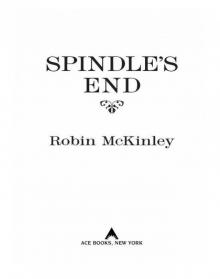 Spindle's End
Spindle's End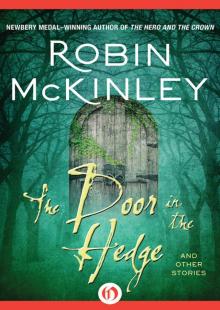 The Door in the Hedge: And Other Stories
The Door in the Hedge: And Other Stories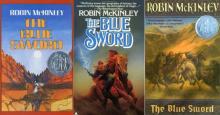 The Blue Sword
The Blue Sword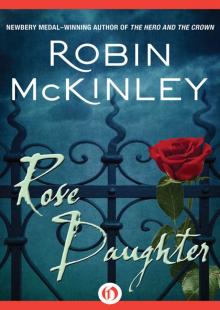 Rose Daughter
Rose Daughter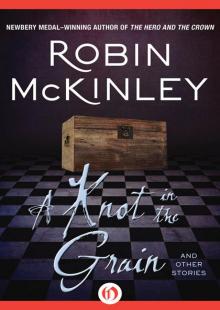 A Knot in the Grain and Other Stories
A Knot in the Grain and Other Stories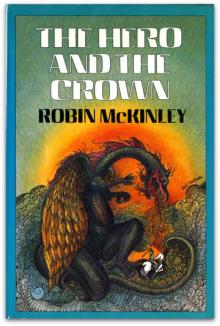 The Hero And The Crown
The Hero And The Crown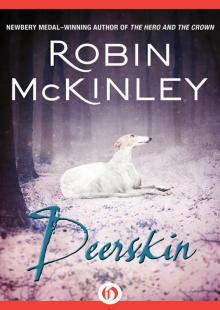 Deerskin
Deerskin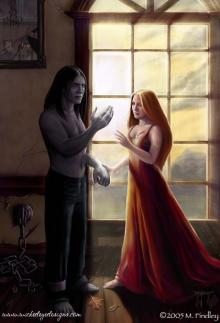 Sunshine
Sunshine Beauty: A Retelling of the Story of Beauty and the Beast
Beauty: A Retelling of the Story of Beauty and the Beast Shadows
Shadows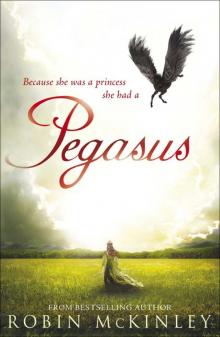 Pegasus
Pegasus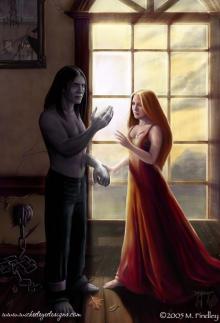 Chalice
Chalice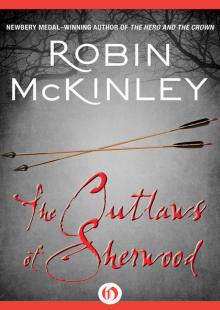 The Outlaws of Sherwood
The Outlaws of Sherwood Fire: Tales of Elemental Spirits
Fire: Tales of Elemental Spirits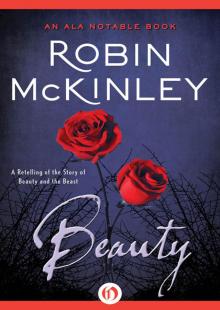 Beauty
Beauty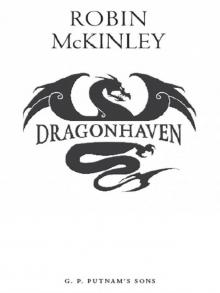 Dragon Haven
Dragon Haven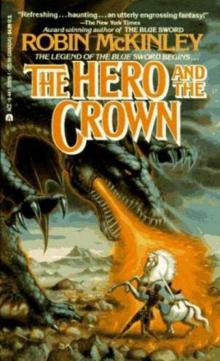 The Hero And The Crown d-2
The Hero And The Crown d-2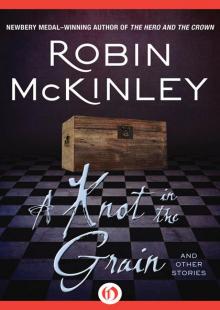 A Knot in the Grain
A Knot in the Grain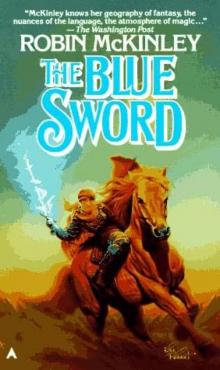 The Blue Sword d-1
The Blue Sword d-1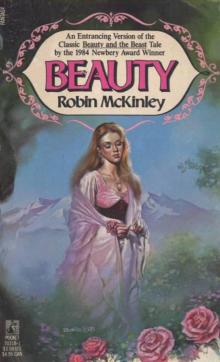 Beauty (v1.2)
Beauty (v1.2)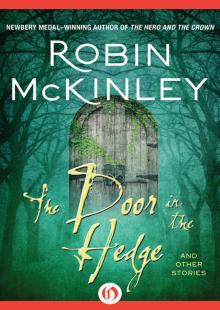 The Door in the Hedge
The Door in the Hedge